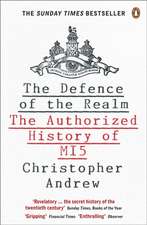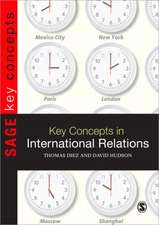The End of the Outer Empire: Soviet-East European Relations in Transition, 1985-90: RIIA
Editat de Alex Pravdaen Limba Engleză Hardback – 9 aug 1992
Preț: 1409.17 lei
Preț vechi: 1718.50 lei
-18% Nou
Puncte Express: 2114
Preț estimativ în valută:
269.73€ • 293.09$ • 226.72£
269.73€ • 293.09$ • 226.72£
Carte tipărită la comandă
Livrare economică 21 aprilie-05 mai
Preluare comenzi: 021 569.72.76
Specificații
ISBN-13: 9780803987234
ISBN-10: 0803987234
Pagini: 256
Dimensiuni: 138 x 216 x 18 mm
Greutate: 0.47 kg
Ediția:1
Editura: SAGE Publications
Colecția Sage Publications Ltd
Seria RIIA
Locul publicării:London, United Kingdom
ISBN-10: 0803987234
Pagini: 256
Dimensiuni: 138 x 216 x 18 mm
Greutate: 0.47 kg
Ediția:1
Editura: SAGE Publications
Colecția Sage Publications Ltd
Seria RIIA
Locul publicării:London, United Kingdom
Recenzii
`Changes in Soviet foreign policy under Mikhail Gorbachev are widely accepted as being one of the major factors in the fall of the communist regimes in Europe. Alex Pravda and the other authors of this readable collection of essays work from inside the assumprions to put it in its proper military, economic and more general foreign policy context... For an edited collection of essays the narrative flows between chapters extremely well so that one is left with the impression that there was nothing that could be done to create a partnership between the USSR and the European communist states based on consensus and shared aims. The result is an excellent summary of the end of Soviet interests in Eastern Europe. It is a useful reminder if the complexity of reforming communist systems for experts and an accessible introduction to this area of Soviet foreign policy for undergraduates' - Journal of Communist Studies
Cuprins
Soviet Policy Towards Eastern Europe in Transition - Alex Pravda
Military Relations - Jonathan Eyal
Economic Relations - Alan Smith
Polish-Soviet Relations - George Sanford
Hungarian-Soviet Relations - Gabriel Partos
GDR-Soviet Relations - Adrian Hyde-Price
Czechoslovak-Soviet Relations - Borek Hnizdo
Romanian-Soviet Relations - Jonathan Eyal
Giving Up Illusions and Unravelling Ties - Jonathan Eyal
1990
Military Relations - Jonathan Eyal
Economic Relations - Alan Smith
Polish-Soviet Relations - George Sanford
Hungarian-Soviet Relations - Gabriel Partos
GDR-Soviet Relations - Adrian Hyde-Price
Czechoslovak-Soviet Relations - Borek Hnizdo
Romanian-Soviet Relations - Jonathan Eyal
Giving Up Illusions and Unravelling Ties - Jonathan Eyal
1990
Descriere
It is remarkably easy to take revolutionary changes for granted after the event. Yet, as this fascinating account shows, the disappearance of communist rule in Eastern Europe was the result of a conjunction of long-term decay and collapse from within with a fundamental shift in the second half of the 1980s in the policy of the Soviet Union.
This study sheds light on the dynamics of the decline of an empire, on the complex interaction of economic, political and security factors in both domestic and foreign policy in shaping revolutionary change. It suggests that the East European states have to contend with a burdensome domestic and foreign policy legacy far more intractable than many initially assumed as they redefine their













